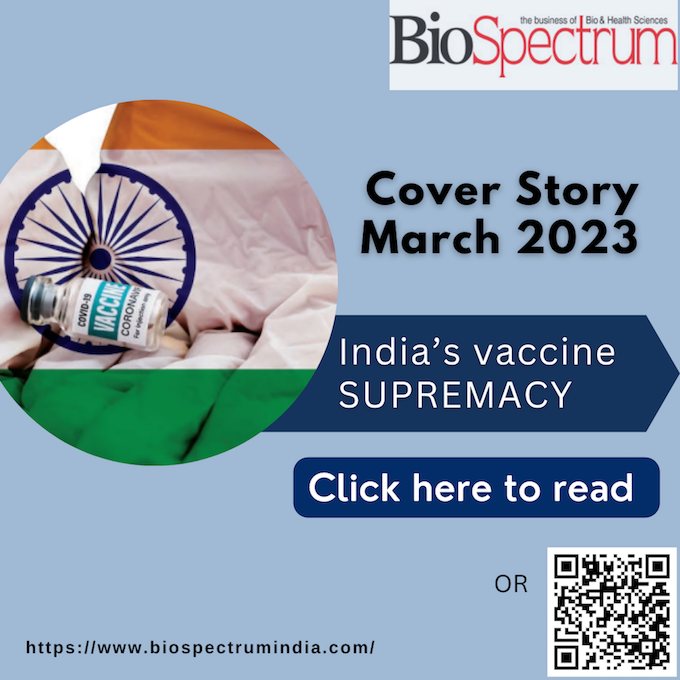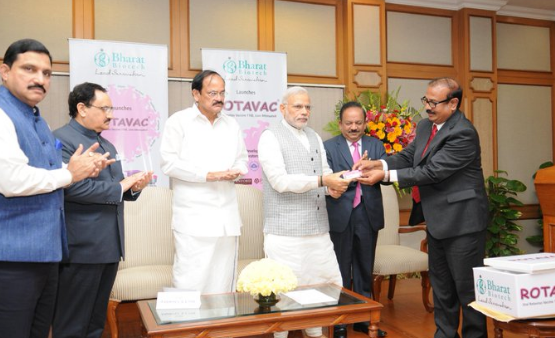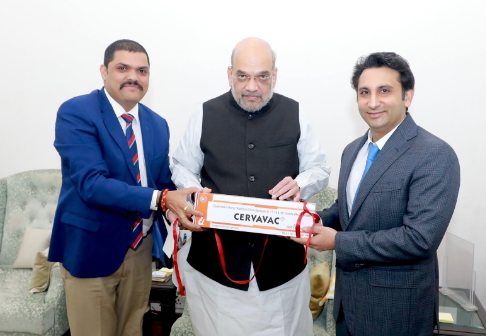India’s vaccine supremacy
March 01, 2023 | Wednesday | Features | By Sanjiv Das
India has been able to mark its presence in both the human and livestock vaccine domain, thanks to rigorous research undertaken by government institutes and private vaccine manufacturers. Vaccines made by Indian companies have taken the country to newer heights and were lauded by the rest of the world as well, during the pandemic for India's capacity to deliver vaccines to many nations in urgent need of jabs. We take a historical glance at India’s steady growth and prowess in the vaccine manufacture and research sphere since the 19th century, catering to inoculations for humans and livestock alike.

India has been at the forefront of vaccine research and manufacturing in the world. During COVID-19, companies such as Serum Institute of India and Bharat Biotech, among others, were able to come up with vaccines that proved to be game changers in India’s healthcare system. Meeting over 60 per cent of the world’s demand and supplying over 2.4 billion doses of COVID-19 vaccines and having a repository of over 50 indigenous vaccines, India’s vaccine story is truly remarkable.
Dr Mansukh Mandaviya, Union Minister for Health & Family Welfare and Chemicals & Fertilisers, Government of India, during an event in Pune last year, said that India had supplied vaccines to 100 countries and provided drugs to 150 countries during COVID-19. He added, “As we go forward, there is an urgent need for strengthening private-public sector partnerships across the vaccine manufacturing value chain.”
The Indian Vaccine Saga: 1978-2023
In the 19th century, efforts were made to replace variolation (a method of inoculation first used to immunise individuals against smallpox with material taken from a patient or a recently variolated individual) with vaccination, setting up vaccine institutes, trials of cholera vaccine and the discovery of the plague vaccine. The early 20th century saw the setting up of more vaccine institutes and the challenges associated with the expansion of smallpox vaccination and typhoid vaccine trials.
The post-independence era saw private players enter the arena. India saw the launch of the Expanded Programme for Immunisation in 1978 and Universal Immunisation Programme in 1985. It may be noted that till 1850 India used to import vaccines from Britain. Logistical issues and an increase in demand prompted the establishment of research institutes and manufacturing facilities in the country. During the early 19th century, some research activities were conducted in Bombay (now Mumbai) and animal experiments for lymph were conducted in Madras (now Chennai).
The outbreak of cholera in Bengal prompted Dr Waldemar Haffkine, a Ukrainian-French bacteriologist known for his pioneering work in vaccines, to visit India and conduct trials in Agra where its efficacy was proven. In 1896, plague broke out in India which prompted Dr Haffkine to conduct research at a two-room set up in Grant Road, Mumbai, that led to the development of the first vaccine in India. In 1899, the laboratory was known as Plague Laboratory, renamed in 1905 as Bombay Bacteriological Laboratory and renamed the Haffkine Institute in 1925.
In the early 20th century, India had four vaccines namely for cholera, smallpox, plague and typhoid. Pasteur Institute of India, Coonoor, is one of the pioneer institutes in India in the production of Anti Rabies Vaccine (dog bite vaccine) and DPT vaccine (triple antigen against diphtheria, pertussis and tetanus) for the Expanded Programme of Immunisation of the Government of India. This institute started functioning as Pasteur Institute of Southern India on April 6, 1907 and was officially opened by Sir Arthur Lawley, Governor of Madras, on April 25, 1907.
Later, on May 1, 1948, the BCG Vaccine Laboratory was established in Chennai and is now working under the Ministry of Health and Family Welfare of the Government of India. The laboratory manufactures freeze-dried BCG vaccines for the control of childhood tuberculosis and tuberculous meningitis in children and supplies to the Expanded Programme of Immunisation (EPI) of the Government of India and other needy medical faculties/ hospitals.
Enter Serum Institute
India saw a revolution in vaccine manufacturing with Dr Cyrus Poonawalla founding the Serum Institute of India (SII) in 1966 to manufacture life-saving immuno-biologicals. India which was facing a vaccine shortage in the country and used to import at high prices saw several life-saving biologicals being manufactured at prices affordable to the common man and in abundance. India became self-sufficient in Tetanus Anti-toxin and Anti-snake Venom serum, followed by the DTP group of vaccines and then later on MMR (Measles, Mumps and Rubella) group of vaccines. Today, the company has more than four indigenously manufactured vaccines.
During the same time, Bharat Immunologicals and Biologicals Corporation (BIBCOL), a Government of India undertaking, started manufacturing oral polio vaccines in bulk in 1966. Hyderabad-based Dano Vaccines & Biologicals introduced Tetanus Vaccine – DanoTT in 1985.
Shantha Biotechnics launched the Hepatitis B vaccine, Shanvac-B, the first recombinant health product in India. Founded by Dr K I Varaprasad Reddy in 1993, Shantha was one of the first Indian biotechs to create a recombinant product, obtaining World Health Organisation (WHO) prequalification for its Hepatitis B vaccine in 2002.
During the same year, Bharat Biotech International Ltd (BBIL) started its operations with Dr Krishna M Ella and Suchitra Ella returning from the US to set up a company dedicated to creating innovative vaccines and bio-therapeutics. Revac-B, an indigenously made genetically-engineered vaccine for Hepatitis-B, was launched in Hyderabad by Bharat Biotech International in 1998. Revac-B was marketed by Ahmedabad-based Intas Pharmaceuticals.
In the same year, Ghaziabad-based BiO-Med unveiled Typhoid Polysaccharide Vaccine, the first indigenously manufactured Vi antigen typhoid vaccine. It was manufactured as per Indian Pharmacopoeia.

Human Biologicals Institute (HBI), a division of Indian Immunologicals Limited (IIL), rolled out the first vero cell culture rabies vaccine in 2000. This is being marketed under the brand name Abhayrab. Post 2000, a number more vaccines were indigenously manufactured. BiO-MED in 2004 produced India Haemophilus Type B Conjugate vaccine (Peda Hib) and Meningococcal Polysaccharide vaccine Group A, C, Y & W135 (Quadri Meningo). Peda Hib is indicated for the prevention in children from six weeks to five years of age, of invasive diseases caused by Haemophilus influenzae type b e.g. Meningitis, cellulitis, epiglottitis. Quadri Meningo vaccine is recommended for children above 18 months of age as routine immunisation in endemic areas.
2006 saw HBI manufacture vaccines such as the DPT vaccine – AbhayTAG, Tetanus Vaccine – AbhayTOX and Recombinant Hepatitis B – Elovac B. SII in 2007 launched its indigenously manufactured low-cost Haemophilus influenza type b conjugate vaccine under the brand name HibPRO in India. BBIL developed BioHib, Haemophilus Influenzae Type b (Hib) vaccine in India, and Comvac 4-HB, a tetravalent combination vaccine. Bio-Med in the same year unveiled Botulinum Toxin Type A (Boto Genie). This is a potent neurotoxin complex which causes relaxation of muscles, marked reduction in gland secretory activity and silencing of nociceptor function on its absorption.
The following year saw BiO-Med unveil the commercially available Typhoid Vi Conjugate vaccine (Peda Typh) that is indicated for active immunisation against Salmonella typhi in infants of the age of three months, children and adults. Cadila Healthcare introduced the H1N1 vaccine in 2010 marketed under VaxiFlu-S, the first indigenous vaccine against swine flu. It was followed by SII indigenously developing an intranasal vaccine, Nasovac, for preventing H1N1 infections.
In 2011, BiO-Med developed its own Meningococcal Polysaccharide vaccine Group A & C (Bi Meningo) that is used to protect against cerebrospinal meningitis and other diseases caused by Neisseria meningitidis (Group A & C).
BBIL in 2013, launched the world's first clinically proven typhoid conjugate vaccine Typbar-TCV, a fourth-generation vaccine against typhoid disease. Typbar was the first vaccine in India to get a WHO-GMP prequalification certificate. BBIL also developed the oral rotavirus vaccine, ROTAVAC, the first indigenously developed Rotavirus vaccine in 2015.

The following year saw New Delhi-based Panacea Biotec announcing the launch of Tetravalent Vaccine Easyfour-TT for active primary immunisation and booster dose against diphtheria, tetanus and pertussis (DTP) and Haemophilus Influenzae Type B(Hib).
2017 saw Zydus Cadila indigenously develop, manufacture and launch India’s first vaccine against H1N1 - Vaxiflu-S. Besides, Panacea Biotec launched the world's first fully liquid whole cell Pertussis (wP)-based Hexavalent Combination Vaccine, EasySix. BiO-MED also unveiled the latest Technology (Ultracentrifugal purified) Vero cell-based Rabies vaccine for Human use (Sure Rab) in the same year. It also launched the Varicella vaccine (Bio Pox) the following year.
Ankleshwar-based Chiron Behring Vaccines announced the re-launch of a purified chick embryo cell (PCEC) vaccine manufactured at its WHO pre-qualified facility in Ankleshwar, Gujarat as ChiroRab in 2019. In the same year, BBIL launched Rotavac 5D used in the prevention of rotavirus diarrhoea, the world’s first and only liquid formulation with the lowest dosage form.
In 2020, SII announced the launch of India’s first indigenously developed pneumococcal vaccine – PNEUMOSIL. This vaccine was launched through a collaboration spanning over a decade between the Serum Institute of India, PATH and the Bill and Melinda Gates Foundation.
COVID-19 shots
COVID-19 opened new avenues for Indian vaccine manufacturers and in 2021, BBIL launched Covaxin, India's first indigenously manufactured COVID-19 jab, developed in collaboration with the Indian Council of Medical Research (ICMR) - National Institute of Virology (NIV). This was followed by Ahmedabad-based pharma firm Zydus Cadila receiving the Emergency Use Authorisation (EUA) from the Drug Controller General of India (DCGI) for ZyCoV-D the world’s first Plasmid DNA Vaccine for COVID-19. The needle-free drug has been developed in partnership with the Department of Biotechnology, Government of India under the ‘Mission COVID Suraksha’ and implemented by BIRAC.
The year 2022 saw many indigenous vaccines being launched in India. Starting with SII’s cervical cancer vaccine CERVAVAC, it was followed by BBIL unveiling iNCOVACC, the world’s first intranasal COVID-19 vaccine. The vaccine has been developed in collaboration with Biotechnology Industry Research Assistance (BIRAC). Hyderabad-based Biological E (BE) in the same year announced the publication of Corbevax, the indigenously produced RBD-protein subunit vaccine.

Pune-based Gennova Biopharmaceuticals, a subsidiary of Emcure Pharmaceuticals, has announced that its mRNA vaccine – GEMCOVAC-19 - received the Emergency Use Authorisation (EUA) from the office of the Drugs Controller General of India (DCGI).
GEMCOVAC-19 is the very first mRNA vaccine developed in India and the only third mRNA vaccine to be approved for COVID-19 in the world. Ahmedabad-based Cadila Pharmaceuticals developed a novel three-dose recombinant nano-particle-based rabies G protein vaccine.
Way to go
2023 will see the launch of vaccines for Hepatitis A (Hep A) and Measles and Rubella (MR) by Hyderabad–based Indian Immunologicals Limited. Besides human vaccines, the company is also working on multiple animal vaccines projects such as Foot Rot (Sheep), Canine 10-in-1 (Dog), MegaVac- KeC (Dog), Lumpy Skin Disease (Cattle), Mastitis (Cattle) 4 in 1, gE deleted IBR marker vaccine (Cattle). Biotech startup Mynvax, incubated at the Indian Institute of Science (IISc) in Bengaluru, has developed an adjuvant subunit-based vaccine against SARS-CoV-2 which is now ready for pre-clinical trials.
The Technology Development Board (TDB), Ministry of Science & Technology is supporting Hyderabad-based startup Sapigen Biologix for the development and commercialisation of two novel vaccines – Intranasal COVID-19 Vaccine and RTS, S Malaria Vaccine. Under the agreement signed, TDB and Bharat Biotech have pledged the support of Rs 200 crore each to create a continuous corpus of Rs 400 crore for the development and commercialisation of the two novel vaccines. The company intends to produce 100 million doses/annum of intranasal COVID-19 vaccine by April 2023 and 15 million doses/ annum RTS, S Malaria vaccine by the end of April 2025.
The future
Traditional vaccines have an upper hand having fewer side effects and Indian vaccine manufacturers have struck the right chord while dealing with the manufacture of indigenous vaccines. As compared to the mRNA COVID vaccines that have side effects, indigenous vaccines like Covaxin are known to have lesser or no side effects.
The Department of Biotechnology has taken steps to curb the COVID-19 threat and as Union Minister of State (Independent Charge) Science & Technology, Dr Jitendra Singh rightly points out that India will make significant investments in R&D to develop a roadmap for the design and delivery of vaccine development for a future pandemic.
The COVID-19 pandemic was an urgent wake-up call and developing the right vaccines at the right time is what Indian vaccine manufacturers need to look up to.
The Union Minister of Science & Technology Dr Singh rightly said, "India was able to develop four COVID-19 vaccines while the whole world was struggling to make even one and contributed to the global fight against COVID-19 by providing vaccine to several countries, under ‘Vaccine Maitri’ initiatives." Dr Singh also mentioned that while efforts are still on to uncover findings about COVID-19 and the epidemiological models, India is ready to invest in future challenges.
Sanjiv Das
sanjiv.das@mmactiv.com












